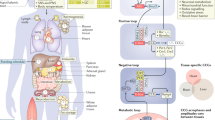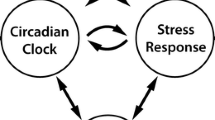
Overview
- Bridges the subject from basic molecular neuroscience to the clinics
- Provides details on the molecular and anatomical basis of circadian function
- Addresses the impact of circadian rhythm dysfunction on brain health including ADHD, drug addiction and mood disorders
Part of the book series: Advances in Experimental Medicine and Biology (AEMB, volume 1344)
Access this book
Tax calculation will be finalised at checkout
Other ways to access
About this book
In this book, leading experts in the field review how circadian rhythms impact the brain. An essential function of mammalian life is the exploitation of the regularities provided by the 24-hour cycle of day and night. The development and evolution of circadian clock mechanisms have allowed us to optimally adapt our behavior and physiology to the external world. Not surprisingly, a growing body of evidence links the disruption of circadian rhythms by genetic, lifestyle and environmental factors to illnesses of the brain.
In the first section of the book, readers will learn about the molecular and anatomic architecture of circadian function in mammals. The ways in which environmental disruptions and misalignments can influence such mechanisms and therefore impair brain function and health status are also addressed. In the second part, the focus shifts to those brain regions responsible for brain function and the body-wide regulation of circadian function. Amongst others, special attention is paid to the role of astrocytes and the brain’s reward and hyprocretin / orexin systems. The book concludes with an extensive discussion on the consequences of circadian rhythm dysfunction. Several chapters present the latest findings on Attention Deficit Hyperactivity Disorder, schizophrenia, autism spectrum disorder, drug abuse and mood disorders.
Written by auhorities in the field, the book provides a state-of-the-art review of the latest findings on circadian clocks in the brain and highlights their potentially far-reaching impacts on our health and well-being. As such, it is essential reading for all neuroscientists and clinicians seeking to understand the intricate connections between circadian rhythms and brain health and illness.
Similar content being viewed by others
Keywords
Table of contents (10 chapters)
-
Front Matter
-
Molecular Gears of the Circadian Clock
-
Front Matter
-
-
Brain Regions Implicated in Circadian Rhythms
-
Front Matter
-
Editors and Affiliations
About the editors
Olivia Engmann obtained her PhD in Neuroscience from King’s College London. Her main interest lies in the molecular basis of mental illness. To that end she has worked in laboratories of leading experts in this field in Paris and New York. She recently moved back to Germany to study the biological basis of depression. Dr. Engmann is currently teaching Neuro-epigenetics, Human genetics and Biology at the University of Jena.
Marco Brancaccio received his PhD degree in Neuroscience from SISSA in Trieste, Italy in 2010. He then joined Michael Hastings-group at the MRC Laboratory of Molecular Biology in Cambridge, UK, where he studied the molecular and circuit mechanisms underlying circadian function in the brain master clock in mammals (the suprachiasmatic nucleus-SCN). He then moved to Imperial College London in 2018, as a Lecturer and a Programme Leader of the UK Dementia Research Institute (UK-DRI) where he leads his research group focusing on the mechanisms driving circadian dysregulation in the early stages of dementia and the exploitation of circadian function for the prevention and cure of neurodegenerative conditions.
Bibliographic Information
Book Title: Circadian Clock in Brain Health and Disease
Editors: Olivia Engmann, Marco Brancaccio
Series Title: Advances in Experimental Medicine and Biology
DOI: https://doi.org/10.1007/978-3-030-81147-1
Publisher: Springer Cham
eBook Packages: Biomedical and Life Sciences, Biomedical and Life Sciences (R0)
Copyright Information: The Editor(s) (if applicable) and The Author(s), under exclusive license to Springer Nature Switzerland AG 2021
Hardcover ISBN: 978-3-030-81146-4Published: 13 November 2021
Softcover ISBN: 978-3-030-81149-5Published: 13 November 2022
eBook ISBN: 978-3-030-81147-1Published: 13 November 2021
Series ISSN: 0065-2598
Series E-ISSN: 2214-8019
Edition Number: 1
Number of Pages: XI, 188
Number of Illustrations: 2 b/w illustrations, 13 illustrations in colour
Topics: Neurosciences, Neuropsychology



